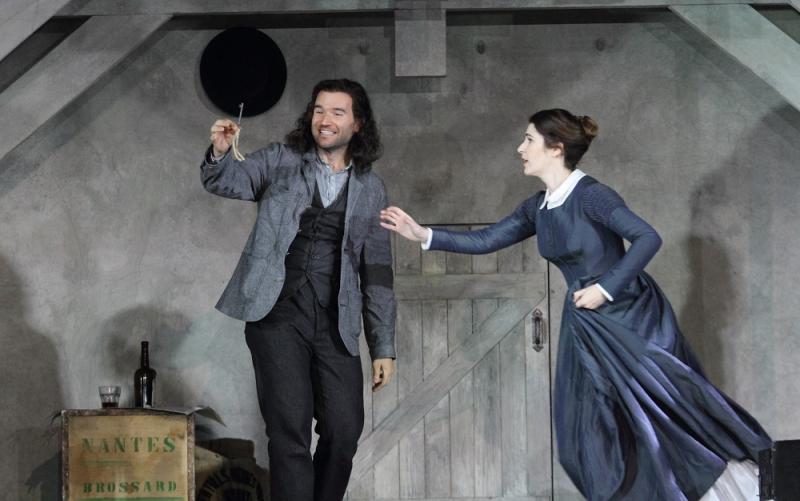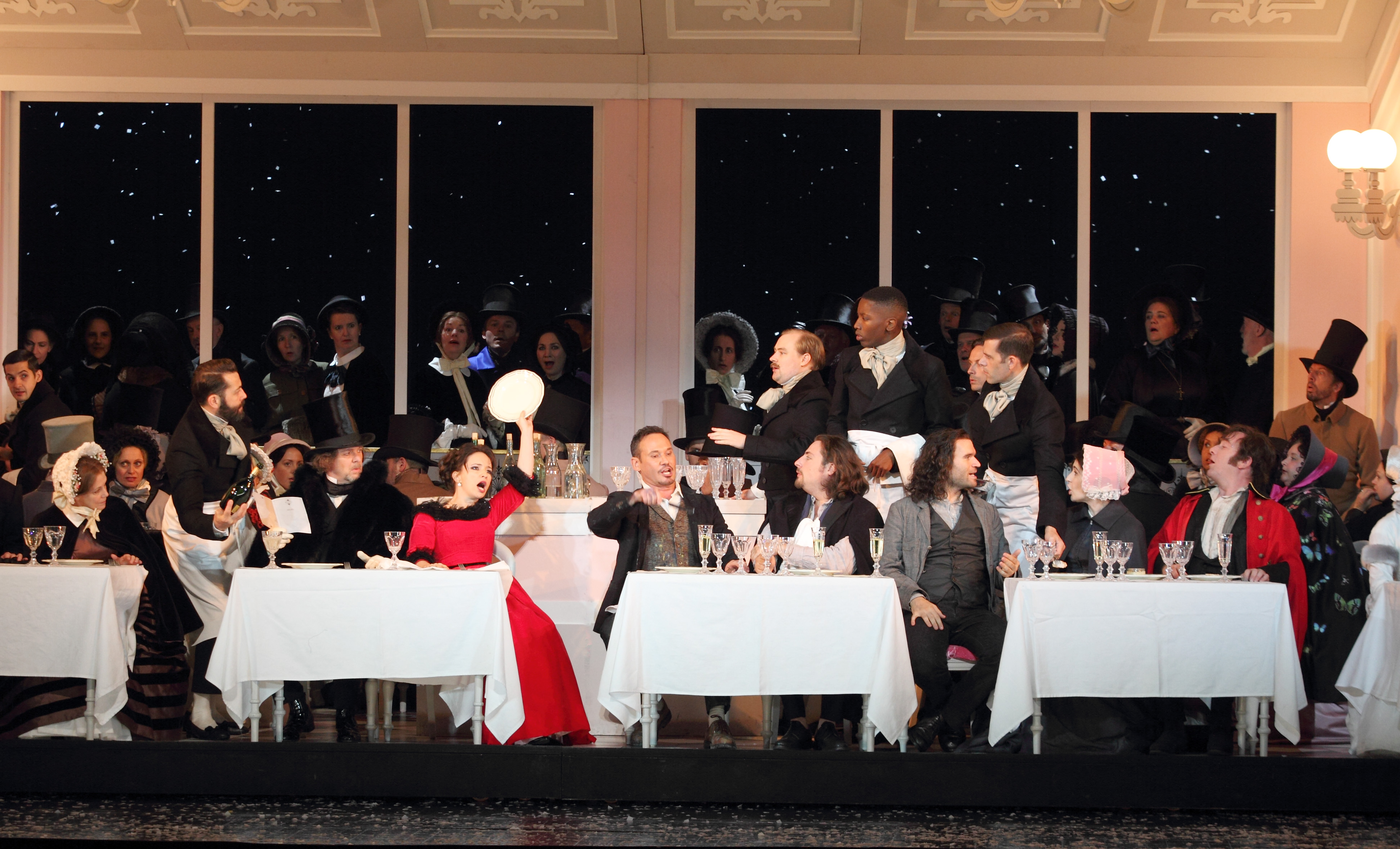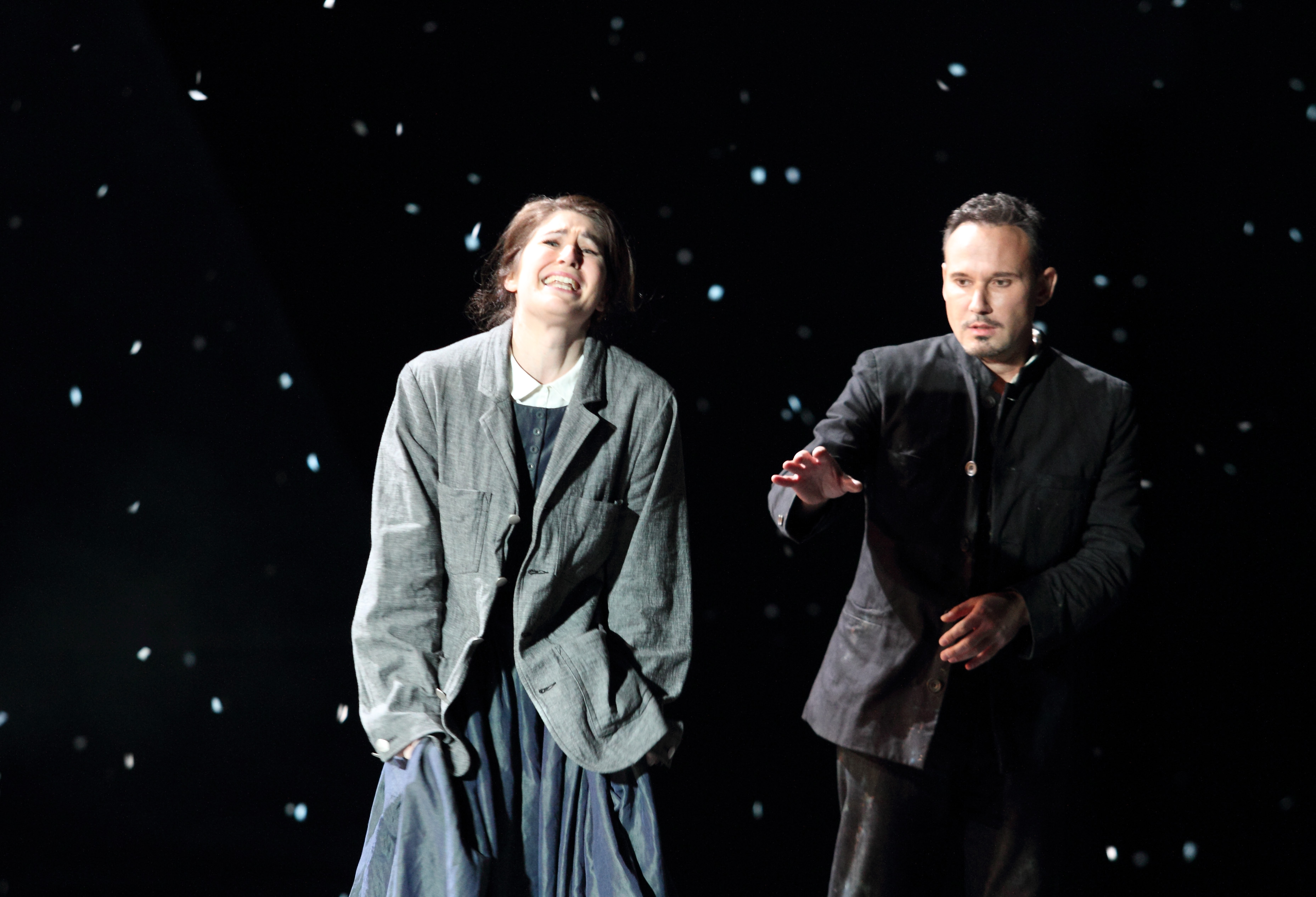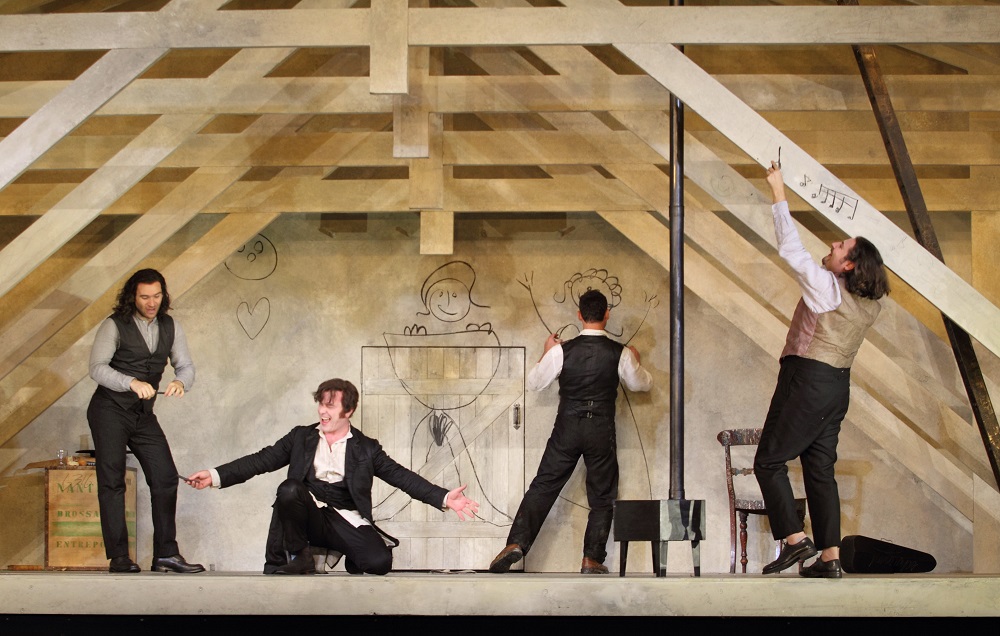La Bohème, Royal Opera review - spectacle and sentiment not yet in focus | reviews, news & interviews
La Bohème, Royal Opera review - spectacle and sentiment not yet in focus
La Bohème, Royal Opera review - spectacle and sentiment not yet in focus
New production from Richard Jones played straight but yet unformed, musically strong

“I’m not in the mood” – “non sono in vena” – sings aspiring poet Rodolfo as he settles down to write a lead article. Was it me, or had the mood not settled by the premiere of the Royal Opera’s first new production of Puccini's structurally perfect favourite for 43 years? The singing was good to occasionally glorious, Antonio Pappano’s conducting predictably idiomatic and supportive.
At the time of directing Puccini’s The Girl of the Golden West for English National Opera, Jones remarked how the composer and his librettists do so much of the work that it would be daft to mess with it much. Yet his community of gold-rush miners brimmed with finely-observed characterisations, and the final coup, a moving one, stays with me. This Bohème, surprisingly rooted in the 19th century like John Copley’s predecessor, is so far fuzzier round the edges. Maybe more rehearsal time would have helped, or perhaps the opera’s special version of realism is simply at odds with any kind of Jonesian stylisation. Certainly the scene where the Bohemians gather at the Café Momus on Christmas Eve (pictured above with Simona Mihai's Musetta in red) has his trademark straight lines, usually enjoying a special turn of the screw with each new production; so far, at least, this doesn’t quite work. Admirable, at least, to have so much downstage and delivered out front – I suspect the essentials can be clearly seen wherever you happen to be sitting in the Opera House.
Maybe more rehearsal time would have helped, or perhaps the opera’s special version of realism is simply at odds with any kind of Jonesian stylisation. Certainly the scene where the Bohemians gather at the Café Momus on Christmas Eve (pictured above with Simona Mihai's Musetta in red) has his trademark straight lines, usually enjoying a special turn of the screw with each new production; so far, at least, this doesn’t quite work. Admirable, at least, to have so much downstage and delivered out front – I suspect the essentials can be clearly seen wherever you happen to be sitting in the Opera House.
Jones’s design team of Stewart Laing (sets and costumes) and Mimi Jordan Sherin (lighting) also delivers on something for Royal Opera regulars to coo over in its three illusionist shopping arcades, eventually yielding, not quite seamlessly, to the interior of the café itself. The rest offers subtle twists on what you might expect – a low-beamed attic (7b, for some reason) with corners for the lovesick Rodolfo and Marcello to hide their emotions in, a bare stage with a cabin tavern at the customs post for Act Three (though seemingly on the roof, since the outside of 7b is there at the back). And lots of snow, with convincing simulation from the principals of feeling "devilish cold" ("freddo cane"), though no moonlight and no candle-snuffed-out darkness for the start of Mimì’s and Rodolfo’s getting-to-know-you. The end of winter which will signal their ultimate parting casts a cruel green light on the two final chords of Act Three, and the attic has a brighter sun shining in, bad timing for consumptive Mimì’s demise. Which Nicole Car delivers with the necessary sensitivity. Earlier, she’s all impulsiveness – a girl of passionate extremes, we quickly realise when she tells her willing listener of how much the first rays of sun in her room at the start of spring mean to her. Car is so good at the sudden bursts of lyricism, especially affecting in the third and best of the acts here (pictured above with Mariusz Kwiecień's Marcello), Pappano’s febrile but authentically Puccinian/Toscaniniesque sense of movement underpinning her to perfection. Michael Fabiano’s “Che gelida manina” is also carefully paced as the first exchange of confidence. His Rodolfo, though, seems a bit of a jerk – no water to revive a fainting girl as illustrated by Puccini’s pizzicati, just a prod of her inert form with his foot which seems more callous than embarrassed. Here’s a tenor of tireless upper-register strength, convincingly stricken in Act Three but overplaying his hand in the stagey sobs at the end of an otherwise truthful Fourth Act.
Which Nicole Car delivers with the necessary sensitivity. Earlier, she’s all impulsiveness – a girl of passionate extremes, we quickly realise when she tells her willing listener of how much the first rays of sun in her room at the start of spring mean to her. Car is so good at the sudden bursts of lyricism, especially affecting in the third and best of the acts here (pictured above with Mariusz Kwiecień's Marcello), Pappano’s febrile but authentically Puccinian/Toscaniniesque sense of movement underpinning her to perfection. Michael Fabiano’s “Che gelida manina” is also carefully paced as the first exchange of confidence. His Rodolfo, though, seems a bit of a jerk – no water to revive a fainting girl as illustrated by Puccini’s pizzicati, just a prod of her inert form with his foot which seems more callous than embarrassed. Here’s a tenor of tireless upper-register strength, convincingly stricken in Act Three but overplaying his hand in the stagey sobs at the end of an otherwise truthful Fourth Act.
Vocal quality is also consistent in Mariusz Kwiecień’s Marcello and his Musetta, Simona Mihai, down to sing Mimi in later performances (it might in a future run be an interesting an idea to have the girls switch roles in select performances, like Lia Williams and Juliet Stevenson in the Almeida’s Mary Stuart). Mihai shows us the full ardour beneath the soubrettish posturing, but despite the attention grabbing on the Momus tables, the relationship with Marcello isn’t quite centre stage, and her rich suitor Alcindoro (Wyn Pencarreg), shorn of the usual gags, simply makes no impression. That’s true, too, of the landlord Benoit (Jeremy White), rather more seriously of Florian Sempey’s Schaunard and Luca Tittotto’s Colline – they’re just generic Bohemians with hair to match and stalwart voices. The blokey horseplay doesn’t quite come off with this team, and though the rapid graffiti-ing antics to substitute for the mock dances in Act Four look good (pictured above), they don’t quite tie in with what's being sung. So much here is sensitively done, and well timed with the music, that I wanted to feel for it more. The ingredients are there, but yet unformed. Give it time, the right team and a brushing-up of Act Two and it could yet be a hit.
That’s true, too, of the landlord Benoit (Jeremy White), rather more seriously of Florian Sempey’s Schaunard and Luca Tittotto’s Colline – they’re just generic Bohemians with hair to match and stalwart voices. The blokey horseplay doesn’t quite come off with this team, and though the rapid graffiti-ing antics to substitute for the mock dances in Act Four look good (pictured above), they don’t quite tie in with what's being sung. So much here is sensitively done, and well timed with the music, that I wanted to feel for it more. The ingredients are there, but yet unformed. Give it time, the right team and a brushing-up of Act Two and it could yet be a hit.
rating
Explore topics
Share this article
Add comment
The future of Arts Journalism
You can stop theartsdesk.com closing!
We urgently need financing to survive. Our fundraising drive has thus far raised £49,000 but we need to reach £100,000 or we will be forced to close. Please contribute here: https://gofund.me/c3f6033d
And if you can forward this information to anyone who might assist, we’d be grateful.

Subscribe to theartsdesk.com
Thank you for continuing to read our work on theartsdesk.com. For unlimited access to every article in its entirety, including our archive of more than 15,000 pieces, we're asking for £5 per month or £40 per year. We feel it's a very good deal, and hope you do too.
To take a subscription now simply click here.
And if you're looking for that extra gift for a friend or family member, why not treat them to a theartsdesk.com gift subscription?
more Opera
 La bohème, Opera North review - still young at 32
Love and separation, ecstasy and heartbreak, in masterfully updated Puccini
La bohème, Opera North review - still young at 32
Love and separation, ecstasy and heartbreak, in masterfully updated Puccini
 Albert Herring, English National Opera review - a great comedy with depths fully realised
Britten’s delight was never made for the Coliseum, but it works on its first outing there
Albert Herring, English National Opera review - a great comedy with depths fully realised
Britten’s delight was never made for the Coliseum, but it works on its first outing there
 Carmen, English National Opera review - not quite dangerous
Hopes for Niamh O’Sullivan only partly fulfilled, though much good singing throughout
Carmen, English National Opera review - not quite dangerous
Hopes for Niamh O’Sullivan only partly fulfilled, though much good singing throughout
 Giustino, Linbury Theatre review - a stylish account of a slight opera
Gods, mortals and monsters do battle in Handel's charming drama
Giustino, Linbury Theatre review - a stylish account of a slight opera
Gods, mortals and monsters do battle in Handel's charming drama
 Susanna, Opera North review - hybrid staging of a Handel oratorio
Dance and signing complement outstanding singing in a story of virtue rewarded
Susanna, Opera North review - hybrid staging of a Handel oratorio
Dance and signing complement outstanding singing in a story of virtue rewarded
 Ariodante, Opéra Garnier, Paris review - a blast of Baroque beauty
A near-perfect night at the opera
Ariodante, Opéra Garnier, Paris review - a blast of Baroque beauty
A near-perfect night at the opera
 Cinderella/La Cenerentola, English National Opera review - the truth behind the tinsel
Appealing performances cut through hyperactive stagecraft
Cinderella/La Cenerentola, English National Opera review - the truth behind the tinsel
Appealing performances cut through hyperactive stagecraft
 Tosca, Royal Opera review - Ailyn Pérez steps in as the most vivid of divas
Jakub Hrůša’s multicoloured Puccini last night found a soprano to match
Tosca, Royal Opera review - Ailyn Pérez steps in as the most vivid of divas
Jakub Hrůša’s multicoloured Puccini last night found a soprano to match
 Tosca, Welsh National Opera review - a great company reduced to brilliance
The old warhorse made special by the basics
Tosca, Welsh National Opera review - a great company reduced to brilliance
The old warhorse made special by the basics
 BBC Proms: The Marriage of Figaro, Glyndebourne Festival review - merriment and menace
Strong Proms transfer for a robust and affecting show
BBC Proms: The Marriage of Figaro, Glyndebourne Festival review - merriment and menace
Strong Proms transfer for a robust and affecting show
 BBC Proms: Suor Angelica, LSO, Pappano review - earthly passion, heavenly grief
A Sister to remember blesses Puccini's convent tragedy
BBC Proms: Suor Angelica, LSO, Pappano review - earthly passion, heavenly grief
A Sister to remember blesses Puccini's convent tragedy
 Orpheus and Eurydice, Opera Queensland/SCO, Edinburgh International Festival 2025 review - dazzling, but distracting
Eye-popping acrobatics don’t always assist in Gluck’s quest for operatic truth
Orpheus and Eurydice, Opera Queensland/SCO, Edinburgh International Festival 2025 review - dazzling, but distracting
Eye-popping acrobatics don’t always assist in Gluck’s quest for operatic truth

Comments
Some terrible sight lines in
Always interesting to know
Always interesting to know/hear from what Dame Edna cheerily labelled the Paups (I've spent a lot of time up there). You're right - directors and conductors should always get someone to check out what's working at every point in the theatre. I well remember the Royal Opera Arabella where I simply couldn't see Karita Mattila in most of her big solos delivered from the top of a staircase.
In my salad days (1962) I